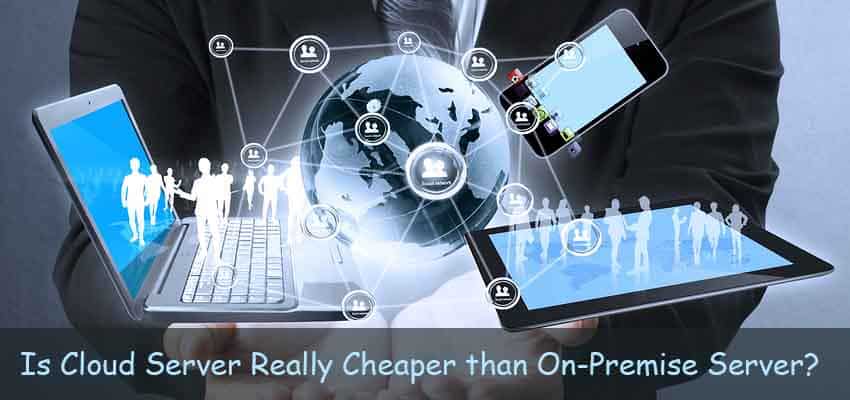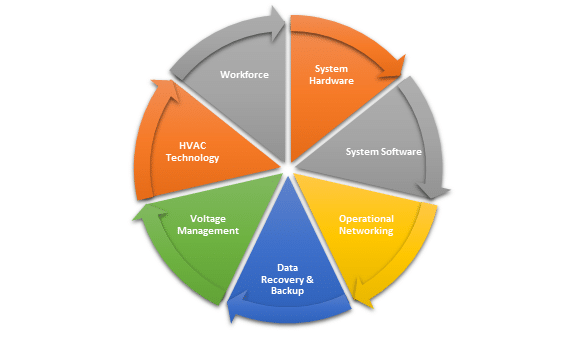Is Cloud Server Really Cheaper than On-Premise Server?
- Blog March 29,2018

Cloud has currently marked as most competitive, affordable and comprehensive solution for businesses. It develops with the organization. It efficiently manages all administrative tasks in an automatic way. It is rapidly implemented by the organizations especially SMBs. Cloud software vendors offer a customized solution for different industries. Other than task management one of the most significant factors that attract the businesses is its affordability. Yes, a cloud server is nowadays considered as a most affordable administrative solution. A lot of benefits are being offered by cloud including easy accessibility, system reliability, scalability, and security. Besides all advantages, it is asked by the businesses whether the cloud is really cheaper than on-premise servers.
How Is Cloud Server Inexpensive Than On-Premise Server?
If you have a data-center or server at your own place it may cost more than cloud. This comparison could be done in a variety of ways. Some of them are enlisted below:

System Hardware
When an organization has their own on-premise server they need to purchase separate hardware. It became essential to equip with latest and most compatible hardware. Equipment that mostly uses for server and data center are not low-priced. They may cost thousands of dollars even for individual components. Server hardware is not based on one or two components but includes separate fan and processor etc.

Investment in this hardware is not one time. An organization needs to upgrade them according to the latest technology. This hardware purchasing and then maintenance need a large investment. This is an investment is not one-time but a business essentially requires this practice on regular basis.
While on the other hand cloud server efficiently save all such investment. Purchasing separate equipment is not necessary for the cloud. Definitely, you need to pay for the service provider’s server-center. But it still cost lower than having your own.
System Software
If a business has decided to have their own on-premise server, they have to purchase the complete software. This software is required to operate purchased hardware. Software purchase is actually an expense for business because it also includes special operating system compatible with hardware.
As compared to hardware, system software needs to update on regular basis. An organization needs to pay for an updated license to the vendor on yearly basis. Meanwhile, if any update received by the vendor it will cost separately for the upgraded version.
While in case of the cloud server, the system will be automatically updated from the back end. No need to invest extra time and payment on software updates. The vendor is responsible for auto updates. The cloud server service provider has efficiently distributed software cost among all of its clients. So, it is inexpensive to purchase a cloud server for a business.
Operational Networking
A business with on-premise server needs to pay especially for web access. Internal networking requires a complete setup with big pipelines. On-premise server, as well as a data center, need to have strong connections that are different from regular cable and modems. Setting up data center at your own place is an expensive approach.
On the other hand in case of cloud, the regular web connection is enough. There is no need to have special cables. It could be easily accessed through regular DSL as well as a cable connection. So, no extra expense to purchase special pipelines and connections.
Data Recovery & Backup
Data back assurance is required in case of on-premise server. You’re fully responsible to back up your important data. There are a variety of organizations offering data backup services to a business. This is another expense a business may face in case of on-premise server. Remember, these data backup service provider has their own but high charges that you’ve to bear. In case of data recovery in an emergency, they’ll require some time to set up things accordingly.
Data backup with the cloud is currently recommended by businesses. It can automatically update all of the data on daily basis. No need to get separate assistance because cloud vendor is accountable to manage auto data backup for you.
Voltage Management
Voltage management is another important requirement for a server as well as a data center. If a business is having their own server room, they will surely take care of power management. It will definitely increase your electricity bills. Power provided to special hardware is not economical. Along with the high bill you need to take care of electricity interruptions.
Again cloud implementation means you’re not directly responsible for all expenses. All is the responsibility of your cloud service provider and you just need to pay your own bills.
HVAC Technology
Heating, ventilation and air conditioning (HVAC) is a technology that supports indoor environment comfortability. Having an on-premise server or data center means, an organization is fully responsible to take care of its HVAC. All of the equipment placed are required to be cool 24/7/365. This cost will add up to your budget else they might cause damages.
Cloud server adoption means the service provider is responsible for this management. So, the outflow will cut down accordingly.
Workforce
You need to hire a professional and experienced workforce to take care of your server room, machinery, and OS. Effective execution and competent error handling are possible only by ensuring the availability of professional and skilled staff. If you’re going to outsource some staff, still it cost higher to a business.
In the situation of cloud implementation service provider offers complete technical support at 24/7. The expense of workforce hiring will be eliminated.
Final Thoughts
There is a huge difference in having cloud server. Investment difference could be easily calculated. A cloud service provider may distribute the expenses among their clients. Still, it is quite cheaper than an on-premise solution.









 Saudi Arabia (English)
Saudi Arabia (English) United Kingdom
United Kingdom Global Site
Global Site